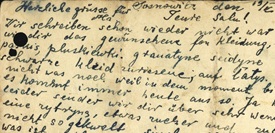Geppersdorf
 “If it weren’t for these dire straits, things would
be
“If it weren’t for these dire straits, things would
be
different, Sala, believe me!”
At Geppersdorf, a labor camp in the Falkenberg district of Germany, hundreds of Jewish men worked on the ReichsAutoBahn (R.A.B.), the ambitious highway
construction project initiated under Hitler. A handful of women
worked in the kitchen and laundry. Sala, one of the youngest women in the
camp, had certain privileges—more food and a private room—because
of her friendship with Ala, who worked
in the camp’s office.
One week after Sala arrived, she began to receive mail through
the German Reichspost.
Most of the letters were from her sister Raizel and close friends
in Sosnowitz. By the end of 1940, all correspondence had to
be written in German to pass Nazi censors, who stamped approved
mail with
the letter “Z,” for zensiert (German for “censored”).
With Yiddish as her mother tongue, Raizel learned German rapidly.
Almost all of her one hundred letters send blessings from their
parents and sisters, and their gratitude for Ala’s guardianship.
They also reveal the family’s constant search for employment,
since working papers were their only protection against deportation.

After almost a year in the camp, Sala and Ala were allowed to
return to Sosnowitz for a “vacation.” Ala secured a
job with the local Judenrat run by
Moshe Merin, which extended her leave indefinitely. Torn between
her family and friends, Sala savored every moment at home. She
was warned that if she did not return to the camp, no one else
would be allowed to go home for a visit.
 Sosnowitz Ghetto, probably 1943
Sosnowitz Ghetto, probably 1943
Reproduced courtesy of the Zaglembie Landsmanschaft
As she left to return to Geppersdorf, her father blessed her for
what would be the last time. Sala never saw her parents or Ala
again. Her only solace was the letters that continued to arrive
from home.
View section images